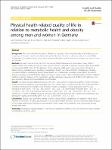Physical health-related quality of life in relation to metabolic health and obesity among men and women in Germany
Truthmann, Julia
Mensink, Gert
Bosy-Westphal, Anja
Hapke, Ulfert
Scheidt-Nave, Christa
Schienkiewitz, Anja
Background: This study examined sex-specific differences in physical health-related quality of life (HRQoL) across subgroups of metabolic health and obesity. We specifically asked whether (1) obesity is related to lower HRQoL independent of metabolic health status and potential confounders, and (2) whether associations are similar in men and women. Methods: We used cross-sectional data from the German Health Interview and Examination Survey 2008–11. Physical HRQoL was measured using the Short Form-36 version 2 physical component summary (PCS) score. Based on harmonized ATPIII criteria for the definition of the metabolic health and a body mass index ≥ 30 kg/m2 to define obesity, individuals were classified as metabolically healthy non-obese (MHNO), metabolically unhealthy non-obese (MUNO), metabolically healthy obese (MHO), and metabolically unhealthy obese (MUO). Sex-specific analyses including multivariable linear regression analyses were based on PCS as the dependent variable, metabolic health and obesity category as the independent variable with three categories and MHNO as the reference, and age, education, lifestyle and comorbidities as confounders. Results: This study included 6860 participants (3298 men, 3562 women). Compared to MHNO, all other metabolic health and obesity categories had significantly lower PCS in both sexes. As reflected by the beta coefficients [95% confidence interval] from bivariable linear regression models, a significant inverse association with PCS was strongest for MUO (men: −7.0 [−8.2; −5.8]; women: −9.0 [−10.2; −7.9]), intermediate for MUNO (men: −4.2 [−5.3; −3.1]; women: −5.6 [−6.8; −4.4]) and least pronounced for MHO (men: −2.2 [−3.6; −0.8]; women −3.9 [−5.4; −2.5]). Differences in relation to MHNO remained statistically significant for all groups after adjusting for confounders, but decreased in particular for MUNO (men:–1.3 [−2.3; −0.3]; women: −1.5 [−2.7; −0.3]. Conclusions: Obesity was significantly related to lower physical HRQoL, independent of metabolic health status. Potential confounders including age, educational status, health-related behaviors, and comorbidities explained parts of the inverse relationship. Associations were evident in both sexes and consistently more pronounced among women than men.
No license information

